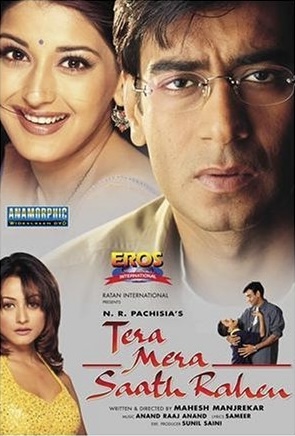 Subhash K Jha refocuses on Mahesh Manjrekar’s Tera Mera Saath Rahe, which released in 2001 and starred starring Ajay Devgan, Sonali Bendre, Namrata Shirodkar, Shivaji Satam, Reema Lagoo, that introduced Dushyant Wagh.
Subhash K Jha refocuses on Mahesh Manjrekar’s Tera Mera Saath Rahe, which released in 2001 and starred starring Ajay Devgan, Sonali Bendre, Namrata Shirodkar, Shivaji Satam, Reema Lagoo, that introduced Dushyant Wagh.
Why do our filmmakers chicken out after making a run for the unexpected entrance door? But let’s be fair. The prolific Mahesh Manjrekar’s Tera Mera Saath Rahe is one from the heart. A moving story of a young harassed working-class hero’s valiant efforts to cope with a sibling stricken with cerebral palsy Tera Mera Saath Rahe rips a hole in our heart when it isn’t busy carting off the poor harried hero for some serious glamour-binging on the Swiss mountains.
It beats me how Anand Raj Anand’s awful songs could have been allowed to interrupt Manjrekar’s mellow drama about a man, a boy and the world around them which supports and strangulates their tender bonding. Raj Dixit (Ajay Devgan)’s working-class commuter’s world of chawl-mere-bhai joys may seem a little over-idealized to us, specially towards the end when the entire congregation from the chawl rushes with open arms to receive Raj’s adorable sibling Rahul . Worse still, the girl Madhuri (Sonali Bhendre) who compelled the confused Raj to put his mentally and physically challenged sibling in an institution , returns in repentant glory to become a part of Raj and Rahul’s extended Utopian world.
All’s well in the slummer’s story, we guess. But what about the raw authenticity and the emotional velocity that we’ve come to associate with Manjrekar’s cinema? For the first three-quarters of the film the director vacillates between intelligent realism and stupid fantasy.
Still some of the characters such as the cantankerous old man who’s been abandoned to a life of stunning solitude by his son, and the “shop inspector” Shivaji Satam and his social-climbing wife Reema Lagoo, come to life. Namrata Shirodkar as the couple’s wayward daughter also puts in a spirited performance. Her character undergoes several shades of change, until we see her as a pregnant misguided waif returning home to a supportive parental atmosphere.
The other heroine Sonali Bhendre fails to make the same impact. Her role is nebulous and ill-defined. And it’s never quite clear why she wants to separate the handicapped sibling from her boyfriend’s life. But yes , Bhendre’s character does serve as a catalyst to trigger off the film’s most absorbing and moving movement.
The last lap of the story when Raj wrenches his brother away from himself and then gradually comes to the clinching consciousness of how emotionally dependent he is on his helpless sibling, is so moving we wonder what kept Manjrekar away from getting to the point for so long. As usual in a Manjrekar film, the performances are first-rate. Dushyant Wagh as the the handicapped boy is so convincing we forget he doesn’t suffer from cerebral palsy in real life. Ajay Devgan is truly admirable in his non-glamorous avatar. But his alarming weight loss makes him look more ill than lithe. Could he go easy on the diet pills, please?
As in Manjrekar’s Vaastav there are superb cameo performances by actors playing the chawl dwellers. Shivaji Satam as the neighbour with rebellious children is once again brilliant. His drunken monologue expressing the bitterness and anxieties of the workingclass gives us gooseflesh. Mahesh Manjrekar himself makes two brief appearances.
The actors playing the low-income (high optimism) group characters are mostly Maharashtrian. Even the children playing victims of cerebral palsy have all been taken from the Marathi stage. They all add to the film’s authentic flavour. But the film is finally felled by fake fuel. The commercial ingredients including the songs are a huge hindrance. Also, the scenes at the hero’s work place with all the employees gabbing aimlessly, seem a little too stagey. The same is true of an encounter between the overwrought hero and an insensitive ward boy at a hospital who calls Rahul ‘paagal’. Fortunately we come away from the film with kind thoughts. Trust Mahesh Manjrekar to always push the envelope, to attempt themes that explore non-glamorous real human relationships. Tera Mera Saath Rahe goes wrong in mistaking the weak for the strong. Its strength lies in its emotional subject matter, not in the commercial trappings that encircle the drama with irksome persistence.









